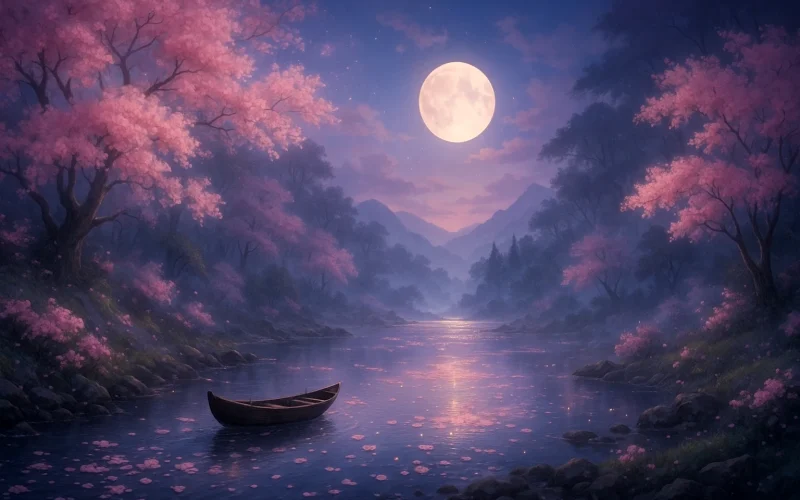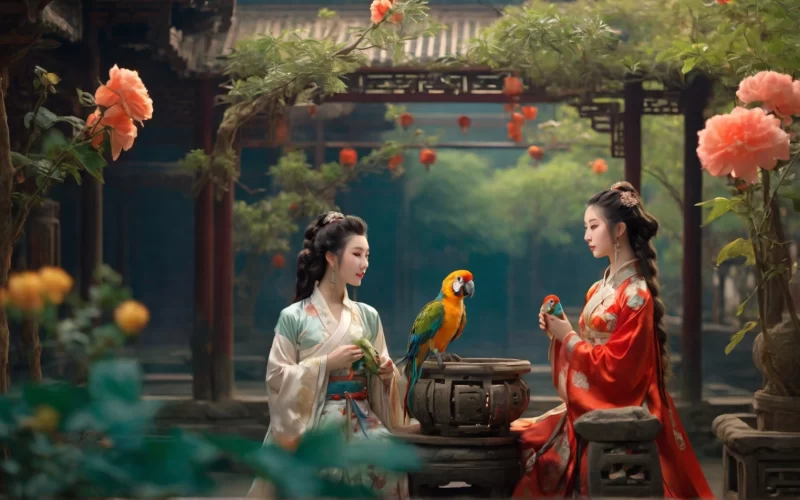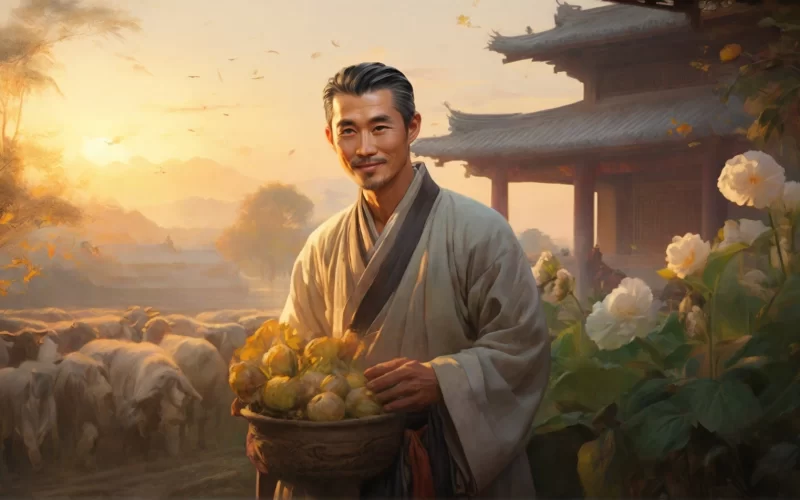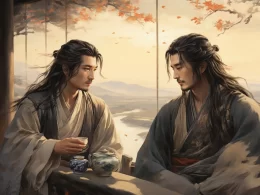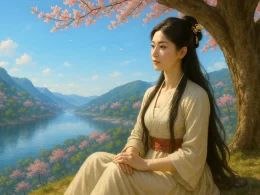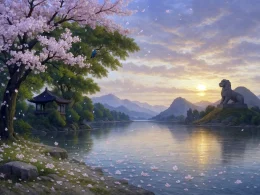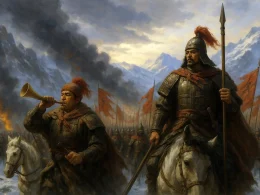Thoughtful elation has no end: Onward I bear it to whatever come. And my boat and I, before the evening breeze Passing flowers, entering the lake, Turn at nightfall toward the western valley, Where I watch the south star over the mountain And a mist that rises, hovering soft, And the low moon slanting through the trees; And I choose to put away from me every worldly matter And only to be an old man with a fishing-pole.
Original Poem
「春泛若耶溪」
綦毋潜
幽意无断绝,此去随所偶。
晚风吹行舟,花路入溪口。
际夜转西壑,隔山望南斗。
潭烟飞溶溶,林月低向后。
生事且弥漫,愿为持竿叟。
Interpretation
This refined pastoral landscape poem was composed during Qiwu Qian's excursion to Ruoye Stream (located southeast of modern Shaoxing, Zhejiang), renowned since antiquity for its serene beauty. As a leading figure of the High Tang pastoral school, the poet masterfully blends natural observation with philosophical contemplation, expressing both his devotion to nature and yearning for reclusion.
First Couplet: "幽意无断绝,此去随所偶。"
Yōu yì wú duàn jué, cǐ qù suí suǒ ǒu.
My soul's deep thirst for quiet never dies, This boat shall drift where chance and current prize.
The opening establishes the poet's contemplative mindset. The phrase "drift where chance and current prize" encapsulates the Daoist ideal of wuwei (non-action), as the journey becomes both physical and spiritual exploration.
Second Couplet: "晚风吹行舟,花路入溪口。"
Wǎn fēng chuī xíng zhōu, huā lù rù xī kǒu.
Evening breeze guides our wandering boat, Through flowered lanes where streamlets float.
Sensory richness emerges through the "evening breeze" and "flowered lanes," painting a springtime idyll. The imagery suggests the poet's joyful surrender to nature's guidance at dusk.
Third Couplet: "际夜转西壑,隔山望南斗。"
Jì yè zhuǎn xī hè, gé shān wàng nán dǒu.
At nightfall we round western coves deep, Beyond peaks, the Southern Dipper's sweep.
Temporal transition occurs seamlessly as celestial observation replaces daylight scenery. The Southern Dipper (Nan Dou) constellation traditionally symbolizes direction and destiny, hinting at life's greater currents.
Fourth Couplet: "潭烟飞溶溶,林月低向后。"
Tán yān fēi róng róng, lín yuè dī xiàng hòu.
Mist rises from pools in spectral flight, Woodland moon sinks behind our night.
Kinetic imagery creates dreamlike movement - the mist's ascent contrasts with the moon's apparent descent as the boat advances, demonstrating the poet's mastery of relative perspective.
Fifth Couplet: "生事且弥漫,愿为持竿叟。"
Shēng shì qiě mí màn, yuàn wéi chí gān sǒu.
Life's affairs surge like flooding tide, I'd be the old man with his fishing pride.
The conclusion crystallizes the poem's essence: rejecting worldly chaos ("flooding tide" of obligations), the poet aspires to the fisherman's simple wisdom - a classic Chinese symbol of harmonious detachment.
Holistic Appreciation
The poem unfolds along the journey of a drifting boat, capturing the shifting scenes from dusk to midnight as the poet travels from the river mouth into mountain valleys. With each movement, the spring night scenery of Ruoye Creek reveals itself—gentle evening breezes, flower-lined paths, a starry sky mirrored in misty waters. The tranquil beauty is rendered with vivid imagery. As the poet seeks secluded wonders, his drifting boat mirrors his gradual detachment from worldly concerns, culminating in a longing to escape society’s clamor and embrace reclusive harmony with nature. This reflects the High Tang literati’s spiritual pursuit of natural simplicity and inner freedom.
Artistic Merits
The poem’s ingenious structure follows the boat’s path, weaving time and space into a flowing landscape painting. Its language is elegantly restrained yet dynamic, with details like “flowering paths,” “mist-laden pools,” and “forest moon” crafting an ethereal atmosphere. The poet masterfully contrasts movement and stillness—such as the moon appearing to retreat behind trees as the boat glides—immersing readers in the journey. Beyond mere description, the scenery becomes a medium for emotion, conveying weariness with worldly strife and yearning for hermitic peace. The profound yet natural expression embodies the High Tang landscape tradition’s aesthetic ideals.
Insights
This poem reminds us that amid life’s chaos, preserving an inner stillness and connection to nature remains essential. The poet juxtaposes serene landscapes against worldly turbulence, suggesting true freedom lies not in physical escape but in mental clarity and deliberate choice. In today’s restless age, reading this work feels like a spring breeze—inviting calm, reflection, and transcendence. It affirms that beauty and peace are timeless pursuits, resonating across centuries.
Poem translator
Kiang Kanghu
About the Poet
Qiwu Qian (綦毋潜, 692–755) was a Tang dynasty poet from Qianzhou (present-day Ganzhou, Jiangxi Province). He earned the prestigious jinshi degree in 726 during the Kaiyuan era and held official positions including Right Reminder and Court Archivist. Celebrated for his landscape and pastoral poetry, Qiwu developed a refined style characterized by serene subtlety. His literary circle included Wang Wei and Meng Haoran, with whom he exchanged poetic works, establishing himself as a key figure of the High Tang landscape poetry tradition.






